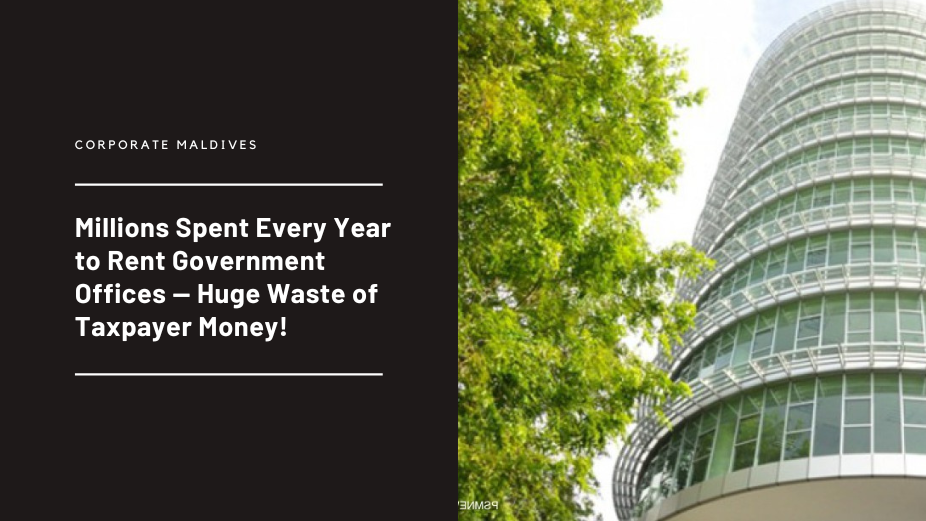The scarcity of suitable infrastructure for state institutions poses a significant obstacle for the government. It was hoped that the construction of a 14-story office building on the premises of Velana building would mitigate this issue. However, the enactment of the new constitution resulted in the establishment of new institutions and the creation of fresh positions.
In addition to the expansion of the civil service, numerous political appointments were made, leading to a severe space crunch for government offices. Consequently, private residences had to be rented, imposing substantial annual expenditures on the state budget, amounting to millions of rufiyaa.
Paying Rent for Private Properties — An Inefficient Use of Resources
Despite an abundance of government-owned land, financial constraints prevent the construction of office buildings, leaving numerous government agencies to operate from private residences by paying monthly rent. This practice is perceived as an inefficient use of government resources, as the expenditure on rent could be utilized to construct purpose-built government offices.
Statistics indicate that during a government’s five-year term, billions of rufiyaa are spent on office rent, with MVR 180 million alone being spent last year. Such expenditures have raised concerns among members of Parliament, who suspect that some individuals may be benefiting from this arrangement.
According to a resolution proposed by MDP MP Ibrahim Muizzu, the government spends an average of MVR 102 million yearly on office rent. During the resolution’s debate, many members of Parliament expressed their belief that there is a lack of a coherent government plan to convert existing government offices and warehouses into purpose-built office buildings. A transparent plan that does not favour particular companies or individuals is required to address this issue.
MP Ibrahim Muizzu has tabled a resolution under Rule 167 of the Rules of Procedure of the House of Representatives to urge an immediate solution to this issue, as the government appears to have no plans to address it permanently.
Umar Zahir Building — Providing Significant Budget Relief
The government has taken steps to address the challenge of limited office space by constructing a six-storey building with parking facilities on a 25,000-acre plot in Hulhumale’, named the Umar Zahir Building after the former Housing Minister. The building has enabled the relocation of three ministries, namely the Gender Ministry, Transport Ministry, and Higher Education Ministry, which had previously operated from privately rented offices. The Gender Ministry, for instance, had been paying MVR 225,000 monthly for office rent, but now operates from the Umar Zahir Building, saving MVR 2.7 million annually.
President Ibrahim Mohammed Solih, speaking at the building’s opening ceremony, acknowledged that the lack of government office space was due to the unavailability of buildings used in the past that have become unusable. He also stated that the government intends to build more office buildings in the future.
Although some individuals have criticized the Umar Zahir Building for being a low-rise structure on a large plot of land, others have suggested maximizing the space by constructing taller buildings to accommodate more offices. Nonetheless, the Umar Zahir Building has provided significant budget relief, saving MVR 12 million annually in office rent.
Expansion of Government Office Buildings is Essential
Despite plans to build government office buildings, implementation has been slow. A proposed 25-storey building on the site of the Ministry of Finance was scrapped due to the challenges posed by its size, and the land now serves as a parking lot. Meanwhile, many government offices continue to operate in old and dilapidated buildings, such as the Gaazee Building and the Billoorijehige. These buildings are plagued by problems like electrical issues and structural instability, and many sections have been converted into private homes due to lack of space.
This has resulted in the state budget spending millions on rent every year, as there are not enough office spaces to accommodate the expanding government services and workforce. While one building has been constructed for offices, many new agencies have been established over the past 15 years without adequate office space. It is clear that a long-term solution is needed, and it is imperative to construct new government office buildings to avoid wasting money on rent and ensure the proper functioning of government agencies.



















